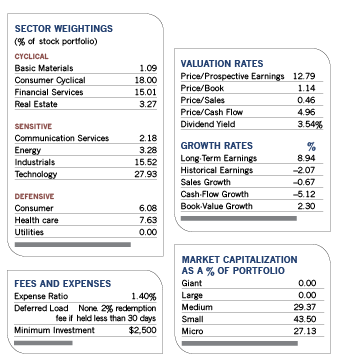Wiggins often buys stocks after their issuers encounter some kind of temporary setback and the shares drop. That was the case for ICON Plc, a large contract research organization helping pharmaceutical and biotech companies bring their products through clinical trials. He established the position in the fourth quarter of 2011, after the company's personnel expansion led to a decline in profitability and a subsequent downturn in the stock's price.
Despite these setbacks, the company has advantages. While major drugmakers are facing patent expirations and have reduced R&D spending, they have increasingly outsourced their drug development to companies like ICON, which was one of only two contract research organizations used by Pfizer last year. Private equity firms have also been acquiring several of the company's peers at attractive prices.
Another company the fund purchased late in the year was Cott, the world's largest producer of private label beverages. Although Cott has faced high commodity prices and a rocky relationship with Walmart, its largest customer, its product offering has become more diverse, and it enjoys significant free cash flow that should allow it to reduce debt or buy back stock.
In August of last year, Intrepid added Computer Sciences, a provider of information technology and business outsourcing services to commercial and government clients. Computer Sciences had reported poor earnings and the stock dipped to a multiyear low, says Wiggins, when it was in danger of losing a large contract. After Intrepid bought a stake, the company planned to write off its investment in this important relationship altogether, and the stock edged down even further.

Wiggins continues to hang on, however, believing that the underlying business is sound, and will be aided by a new CEO. That, he says, "may help restore the company's image and demonstrate to investors the appealing cash-flow characteristics of the business."
The fund also has a position in WWE, formerly known as World Wrestling Entertainment. This holding is interesting, Wiggins says, because even though WWE faces increased competition from sports such as ultimate fighting and has seen a decline in pay-per-view revenues since 2007, its fan base, many of them women and children, are unique and loyal. A number of the company's long-term television contracts on programs such as Raw and Smackdown give it revenue stability, as do licensing agreements with toy and video game makers. The company is launching a TV network in April that should have the backing of Comcast and other major cable operators, giving it greater ability to monetize its thousands of hours of content.
Wiggins first bought the stock last year when the price dropped following a dividend reduction. On the plus side, the dividend yield remains an attractive 5%, and WWE carries no debt.
Another holding is Federated Investors, the second-largest manager of money market products in the world. Federated saw its stock slip late last year as investors became increasingly concerned about low interest rates, which have forced the company to cut its management fees in order to deliver a small positive return to investors. Concerns about European bank debt exposure and possible SEC reforms to money market funds are also weighing on the stock.
But Wiggins sees a number of catalysts for improvement at Federated, including the prospect of higher interest rates. "Future money market reforms could crimp profitability, but we think the SEC is unlikely to enact measures that will severely disrupt the industry," he says. "Federated also derives half its revenue from its equity and fixed-income funds, and its conservative portfolios have fared better than average in tough times."








